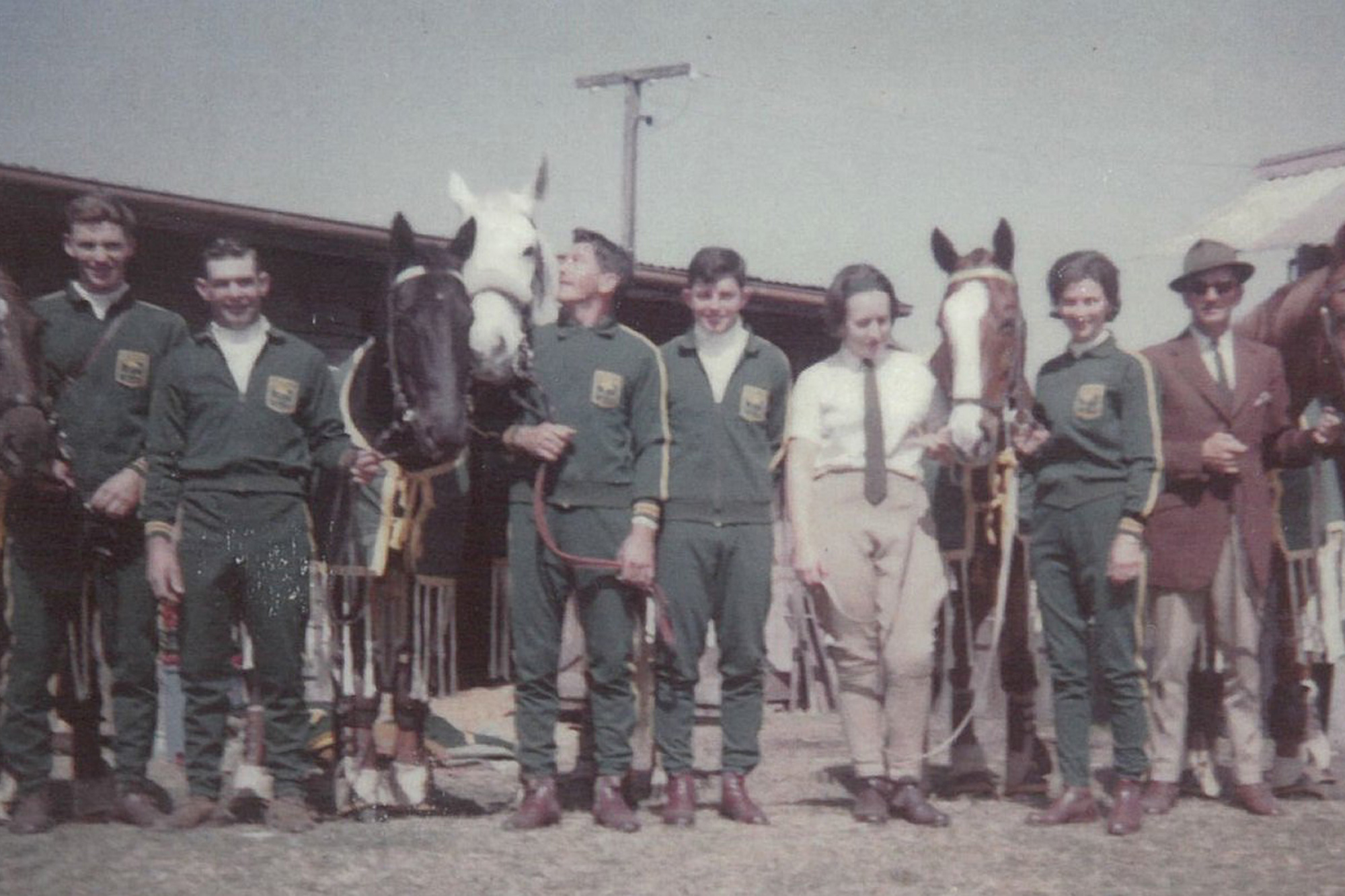Australia’s Olympic Jumping History

Above: The Australian Olympic Jumping Team prior to boarding the ship for Tokyo 1964. (l-r) Barry Roycroft and Genoe, John Fahey and Bonvale, Kevin Bacon and Ocean Foam, grooms Milton and Margaret, Bridget ‘Bud’ MacIntyre and Coronation and Karl Jurenak (coach) and reserve horse Brahmin.
Article by Hannah McKinney
With the 2024 Paris Olympic Games less than 3 months away, excitement is building as we excitedly await the Australian Olympic Committee’s announcement of our Jumping Team.
Before the Games get underway in one of the world’s most picturesque cities, we want to take you on a trip down memory lane and explore Australia’s Olympic Jumping History.
Australia’s first ever Jumping team made its debut at the 1964 Tokyo Olympic Games which was an Olympic Games of firsts for another reason as it was also where rider Bridget ‘Bud’ Hyem (nee Macintyre), became the first woman ever to represent Australia in an Olympic Equestrian Team. Hyem with Coronation joined John Fahey and Bonvale, Kevin Bacon and Ocean Foam to make up the three-man Australian Olympic Jumping team. Barry Roycroft and Brahmi were the reserves.

If qualifications weren’t hard enough, the athletes and their equine partners made the treacherous trip to Tokyo via ship, before embarking on a 580km journey by road. To keep the horses fit, the riders would lunge the horses in a specially built sand yard, on the deck of the ship. The combinations competed on the last day of the Games, and the course was not easy. Though not overly high, the grounds were heavy from previous rainfall, and spreads were massive.
Extraordinarily, despite the team’s relative inexperience to international competition, the 1964 Tokyo Olympic Games became record-setting for the showjumpers. The team finished in 7th place overall, which 40 years on, remained Australia’s best performance, until Beijing 2008, where the team also placed 7th. This was no easy feat, as there was not a single clear round in the first event.
The Games also resulted in Australia’s best individual performance in Jumping, with John Fahey and Bonvale finishing in 4th place overall, narrowly missing out on a medal. Fahey, at only 20 years old, with his small but mighty Bonvale jumped off against Peter Robeson for 3rd place, but were unluckily relegated to 4th. Due to an injury, Hyem and Coronation had had very little jumping preparation in the leadup to the event, finishing up 24th with 16 faults. Bacon and Ocean Foam finished with 29.5 faults from two rails and an unfortunate refusal.
The high-altitude location of the 1968 Mexico Games meant that the air contained lower levels of oxygen, making it harder for the horses to acclimatise and perform. This combined with the course being the biggest track ever built (one oxer was set at 1.83m with a width of 2.21m), made it no easy feat for the 1968 Australian Olympic Jumping Team.
Above: Sam Campbell and April Love at Mexico 1968 Olympic Games.
Returning to the team were John Fahey and Bonvale, Kevin Bacon and his new mount Chichester, and new addition, Sam Campbell and April Love, where the team finished 9th overall. Once again, Australia was only inches away from an individual bronze medal, this time with Kevin Bacon and the eight-year-old Chichester (now in Equestrian Australia’s ‘Hall of Fame’). After the first round, the combination were placed 3rd with 4 faults, but unfortunately in the final round, Bacon took a spill, finishing up with 28.75 faults and 18th place. Sam Campbell’s small, brave grey mare April Love placed a very respectable 26th.
Above: The Australian Jumping team for Mexico.
Security was tight at the Montreal 1976 Games after the Munich Massacre, but it didn’t deter our Australian Jumping Team. Guy Creighton and Mr Dennis, returning stars Kevin Bacon and Chichester, and Barry Roycroft and Four Corners made up the team. Despite a massive, solid course, the team placed 9th, with Guy Creighton and Mr Dennis finishing up at a respectable 5th place individually. An Olympic medal eludes our Australian jumpers once more…
Above: Guy Creighton and Mr Dennis at the Montreal 1976 Games.
Following the Soviet invasion of Afghanistan, over 80 nations, including Australia, boycotted the 1980 Moscow Olympic Games. The Australian Olympic Jumping Team was made up of Guy Creighton, Gavin Chester, Greg Eurell and Marianne Gilchrest. The team was able to compete at the alternate Olympics in Rotterdam, where they placed 8th.
14 nations led by the Soviet Union boycotted the 1984 Los Angeles Games, resulting in a slightly reduced number of athletes. The Equestrian games were held at Santa Anita Park, with the Australian Jumping Team made up of Jeff McVean and King Omega, Greg Eurell and Mr Shrimpton, and George Sanna and Kite. The team finished 9th overall, with Jeff McVean and Greg Eurell placing individually in the top 30.
Korea in 1988 was a country with a very small equestrian tradition. The Seoul Equestrian Park, the site of the equestrians’ sports for the 1988 Seoul Olympics, had stables for 970 horses, which could almost have stabled every horse in the country at the time! Horses arriving to Korea were subject to stringent quarantine measures, spending a mandatory 21 days of pre-flight quarantine.
The Australian Jumping team comprised of George Sanna and Schnappes, Rod Brown and Slinky, Vicki Roycroft and Mickey Mouse and Jeff McVean and Whisper Grey, and placed 10th overall. George Sanna and Rod Brown made it to the final of the individual round placing 28th and 29th respectively.
For the first time since 1972, the Barcelona 1992 Olympic Games were boycott free in unfortunately, there was no Australian Olympic Jumping Team.
Forecasts of extreme heat and humidity at Atlanta 1996 led to extensive research into the best conditions for equine athletes. But the Australian team, made up of Vicki Roycroft and Coalminer, Russell Johnstone and Southern Contrast, David Cooper and Red Sails, Jenny Parlevliet and Another Flood, were certainly no strangers to this kind of climate and the team ended up placing 19th overall.
And now to (arguably!) every Australians favourite Olympics – Sydney 2000. And we aren’t alone in this view, with IOC President at the time, Juan Antonio Samaranch declaring it “the best Olympic Games ever”. The Sydney Olympic Games marked the first time Olympic horses competed in Australia, as when Melbourne hosted the Olympics in 1956, the equestrian events were held in Stockholm, Sweden. Sydney International Equestrian Centre (SIEC) at Horsley Park was constructed and hosted horses from around the world following a two-week quarantine period in Europe and another two in Sydney. The Australian Jumping Team consisted of Jeff Bloomfield and Money Talks, Jamie Coman and L.L Zazu, Ron Easey and Rolling Thunder and Gavin Chester and Another Flood and finished 10th overall. Jeff Bloomfield was our best placed individual rider for these Games in 20th place, with Jamie closely behind in 33rd.
In 2004, the Games returned ‘home’ to Athens, the site of the first ever modern Olympic Games. Whilst there wasn’t an Australian Jumping Team at the Athens 2004 Games, Tim Amitrano and Mr Innocent represented Australia as an individual, however, did not make it to the final.
Beijing 2008 was the site of one of the Australian Olympic Jumping Team’s best performances. The team, made up of Edwina Tops-Alexander and Itot du Chateau, Matt Williams and Leconte 6, Laurie Lever and Ashleigh Droseel Da and Peter McMahon and Kolora Genoa, were in contention for the bronze medal right up until the final rider went out on course. The team ended the competition in 7th place, which alongside the Games in Tokyo 1964, remain as Australia’s best performances.
Individually, Australia also had strong performances. A rule change meant that only 35 riders were allowed to ride in the individual final – as compared to 45 in Athens. The Aussies remained formidable with Edwina Tops-Alexander and Matt Williams in equal 10th place, with Laurie Lever in 22nd.
The London 2012 Olympic Games celebrated 100 years of equestrian sport in the Olympics. The Jumping Team of Edwina Tops-Alexander and Cevo Itot du Chateau, Julia Lynch and Vedor and James Patterson-Robinson and Lanosso Ooo, and Matt Williams and Watch Me VD Mangelaar placed 10th. Edwina Tops-Alexander delivered another strong individual performance, landing in 20th place, with Julia Lynch and James Patterson-Robinson finishing up in 35th and 43rd respectively.
The first Olympic Games held in South America was Rio in 2016. The team of returning Olympians, Edwina Tops-Alexander and Lintea Tequila, Matt Williams and Valinski S, James Patterson-Robinson and Amarillo, and Scott Keach and Fedor placed 13th. This was Scott’s second Olympics, his first was 28 years prior in Eventing. Individually, Edwina Tops-Alexander had her best ever Olympic result in equal 9th place. Fellow experienced jumper Matt Williams placed 28th overall.
Tokyo 2020 was an Olympic Games full of upheaval, mainly due to the onset of COVID-19. The competition was rescheduled to 2021, but there were a few other bumps in the road from there. Unfortunately Australia were unable to field a Jumping Team however Edwina Tops-Alexander and Identity Vitserol and Katie Laurie and Casebrooke Lomondwere able to compete as individuals. Unfortunately, they did not proceed past the first round of competition with Edwina having one rail, and Laurie withdrawing after four.
Above: Edwina Tops-Alexander and Identity Vitserol at the Tokyo 2020 Games
After the Jumping Team qualified for a Paris 2024 team quota spot at the FEI Olympic Qualification Event for Group Gin Valkenswaard last year, it has all ramped up and the excitement is building. Competitors are working hard to impress selectors and now we must all sit tight as we await the announcement of who has been chosen to represent Australia and compete in the incredible grounds of the Palace of Versailles later this year and claim the honours of having represented their country in the Paris 2024 Olympic Games.














